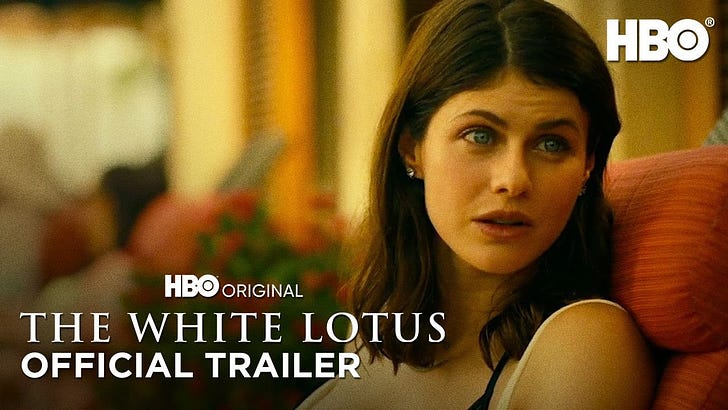

Discover more from Holodoxa
The Envy Box: Class-Status Obsession in Prestige TV
What is the nature of the hold that programs like Succession and The White Lotus have on the psyches of elites?
Television is the dominant narrative medium of the 21st century. I’m not talking about network TV serials, reality TV, or formulaic, episodic programs. I am of course referring to long-form visual stories that have borrowed concepts from the novel. These programs, called prestige TV, have iterated on the novel’s foundation of sustained and sophisticated psychological portraits. This is a judgement made based on audience size, audience demographics (young-ish, educated, upwardly mobile or affluent), and public discourse content. These are the shows that occupy the chattering class, critics, yuppies, and the very online. I explored this phenomenon, which has been widely commented on by others, in a prior post on The Leftovers (2014-2017). Today, I want to discuss the central thematic focus of the second generation of prestige television shows: class and status. In fact, I will refer to these together, “class-status,” as often the relevant hierarchies are ranked more by sociocultural cache than material differences alone. The Beverly Hillbillies aren’t settling down to chortle at the acerbic satire of The White Lotus on HBO. They’re watching the flinty melodrama of Yellowstone live on CBS.
Disclaimer: It would be distracting to define what we actually mean by “prestige TV” here. It would also be unduly arduous to comprehensively survey prestige entertainment programs and clinically dissect the themes therein. If someone would pay me to do it, I would gladly do it. Until then, I’m going to do something much less rigorous but hopefully still interesting: look at what tastemakers are obsessively watching and discussing and then speculate wildly about why. And for simplicity I will focus on two active shows, The White Lotus (2021-present) and Succession (2018-present). Please indulge me. Because there’s infinite content and there is nothing new under the sun, here are similar discussions for context: Narrative Control Podcast on The White Lotus, Caviar Cope, and The Ringer's Prestige TV Podcast.
The Leitmotif Shift in Prestige TV
The first generation of prestige TV, exemplified by shows like The Sopranos, Breaking Bad, and Mad Men, were preeminently concerned with masculine megalomania, especially as a metaphor for American decadence and decline. This broad and usually somewhat self-directed critique - showrunners and auteurs ofter operate autocratically - was merged with the meme of “toxic masculinity” by less sophisticated and more polemical critics, cultural commentators, and pundits. This meme was resonant with younger and more progressive elites who felt disaffected by the second Bush administration's swashbuckling ethos and the red-pill backlash to the left-wing triumphalism of the early Obama administration. Some of these sentiment were reinvigorated by #MeToo and the Trump era, which correlated a bit with a return by Millennial to the prestige programs of the early 00s, especially The Sopranos. But this energy has since been extinguished by upheavals like the end of the Trump administration, the Covid-19 pandemic, inflation, social justice fatigue, and internet-driven cultural fragmentation.
Our second epoch of prestige TV, launching in the mist of the streaming wars, has turned its focus away from hegemonic masculinity and to Nietzschean Ressentiment (what I’m calling a class-status obsession). In other words, it is less preoccupied with the evils perpetrated by the nature of man and more preoccupied with mammon. But it less a condemnation of greed and inequality than an accidental confession of the anxiety that attends the relentless jockeying for a fixed and scarce amount of status and the inevitability of compelled deference to one’s betters. In a world where almost everyone’s material needs are met, if not unhealthily exceeded, and where transparent displays of opulence are gauche and cringe, what actually distinguishes the affluent and the hoi polloi, the enlightened and the benighted? And in a fragmented culture and an intense, oversaturated attention economy, how is status and power durably achieved?
Rob Henderson argues that elites and associated aspirants have sought to resolve this problem by adopting “luxury beliefs” as a costly social signal. Essentially, elites figuratively act as both the swindler and emperor from the Hans Christian Andersen folktale “The Emperor's New Clothes,” devising fantastical ideas and parading them around as amazing and insightful despite their clear emptiness. There is a darker edge to this status racket as well because of the deep inauthenticity involved. The elites may superficially model or advocate for luxury beliefs but often behave to the contrary in private or can compensate for the cost incurred. A good example here would be the public promotion of non-normative gender expression, polyamory, and childlessness by elites who actually live in traditional bourgeois marriages with several kids. Henderson himself believes prestige television is important to watch because it incidentally provides a window into the minds of elites. I think I agree. It is a medium where elites sometimes reckon with the cognitive dissonance associated with ruthlessly chasing and guarding status while mouthing progressive pieties. It is also a place where their anxieties are revealed. Things never rise to a true reckoning, but at least these programs nudge these ideas into the collective consciousness.
What Does Prestige TV’s Class-Status Obsession Signal?
Into this landscape of a hidden status game, enter two shows: The White Lotus and Succession. The White Lotus is an anthology series, meaning it shakes up the cast of characters and setting in each season. It examines the lives of wealthy vacationers under the guise of being an offbeat murder mystery. Each season begins with the reveal of an unnamed dead body, then jumps back a week or so and introduces a group of eccentric and often insolent affluent people who descend like locusts on a given White Lotus resort. Darkly funny and awkward chaos ensues. The show tends to follow 2-3 main groups of characters and quite transparently addresses itself to contemporary ideas in public discourse. Succession is also a dark comedy but is mixed with conventional dramatic tropes. The show has a ruthless and sometimes angry tone not present in The White Lotus. Succession follows a fictionalized Murdoch family of discontents trying and failing to succeed pater familias (Logan Roy) as CEO of Waystar Royco. The show focuses on the personal failings and pettiness of the four Roy children: Connor, Kendall, Shioban, and Roman (Connor is mostly a side joke though).
Both shows address themselves to upper middle class consumers and tastemakers. On their surface, they appear to offer biting and sometimes cynical perspectives on the ultra-wealthy and cultural elites. One of the many criticisms one hears from normie viewers of these shows is that, “there are no characters to root for” or “everyone sucks” or “no one’s relatable.” This isn’t a bug. It’s intentional. The question is just how deeply this unvarnished portrait intended. Is it specific to the rich? Does it extend to the upper middle class? Is it a cynical take on all humanity? Regardless, it is inevitable that a good portion, if not majority, of the audience for these shows is either unknowingly or knowingly the subject of its satire. Yet no one seems to be taking offense, and these shows enjoy broad critical appraise from critics on both the political left and right.
One could read these shows as attempts to stoke an intra-elite class war of sorts - pitch the professional-managerial class (PMC) against the “millionaire and billionaires.” However, I think the shows would be much less broadly appealing to audiences if it was just a straightforward Marxist take. The politics of the showrunners here are quite obviously liberal-to-progressive, but the politics isn’t foregrounded nor is it eagerly orthodox. There is quite a bit of ambivalence that comes through and a deeper interest in the social psychology of elites. For instance, both shows appear to revel in displays of wealth. The settings and costumes are ornate and beautiful: private jets, five-star resorts, exotic locales, yachts, etc. The displays of wealth aren’t being wholly panned either. They are signaled as guilty pleasures with self-aware ironic commentary often spouted by various characters (Tom and Greg in Succession are often deployed in this way). Nonetheless, it is clear the opulence is meant at least partially to titillate the audience.
So how should we as viewers understand these shows? I think there four main interpretations (some of which I’ve previewed):
A straightforward satire of the dissolute and undeserving elite class - more or less a Marxist polemic.
A veiled reactionary satire of the bizarre mores of elite culture, including fashionable ideas about gender, sex, and race, and the associated sanctimoniousness and self-aware hypocrisy. Essentially, a confession about the luxury belief racket.
The caviar cope hypothesis: this entertainment is faux criticism of the wealthy designed to make the PMCs (presumably the majority audience of these programs) feel smug about themselves. A sotto voce component of this is reveling in opulence while maintaining a pose of humility.
A clear-eyed investigation of the Machiavellian aspects of human nature, specifically focused on Rene Girard's mimetic theory of desire.
I think we’ve effectively complicated interpretation one and can set it aside despite its relevance. Related, I think the caviar cope hypothesis has some merit, but strains credulity. Showrunners Jesse Armstrong (Succession) and Mike White (The White Lotus) aren’t the type to strive to encourage complacency. In general, artists, writers, and creators want to influence and move their audience even when their main incentive is to entertain. So those favoring interpretation three have to argue that complacency is an unintended effect. This isn’t implausible given what’s been argued about much of postmodern entertainment. It is just less illuminating to explore the effect on the audience than the intentions of the creators. Interpretation two is true to an extent but also strains credulity. Armstrong and White are on the left and show few reactionary tendencies. The White Lotus and Succession are somtimes critiques of certain in vogue ideas about social justice. For instance, they have little patience for silly ideas about sex or power, and they clearly find many social media activist cliches cringeworthy. But nowhere in this controlled reaction is there a true confession of guilt or a desire for a more conservative cultural model. In some cases, a true fear and loathing of the right is revealed like in Succession (e.g. Season 3, Episode 6). So finally, we’re left with interpretation four, which I think is the most persuasive. These shows intentionally explore the ineradicable human drive to accrue prestige and show that status is modeled by those of status who came before. This is an uncomfortable and ugly truth and hence the satire of it. It is cycle we’re all trapped in with no immediate alternative so we might as well poke fun at it. I at least appreciate a blunt perspective on human nature.
The leitmotif shift in prestige TV is important as I think it does speak to some elite anxieties. We should watch closely. It may give us an edge. I jest. It is just anthropologically and culturally interesting. I can’t help naval gazing I guess. Plus, it is true that the economic and cultural environment is prodigiously competitive, and it may be unreasonable to expect the pie to grow as fast as it has in the past. And the status pie is more or less always fixed anyway! So competition may only grow more intense! Although I don’t think hilarious satirical commentary in television will enable new model of social organization, it at least can illuminate who we are even when its ugly.











